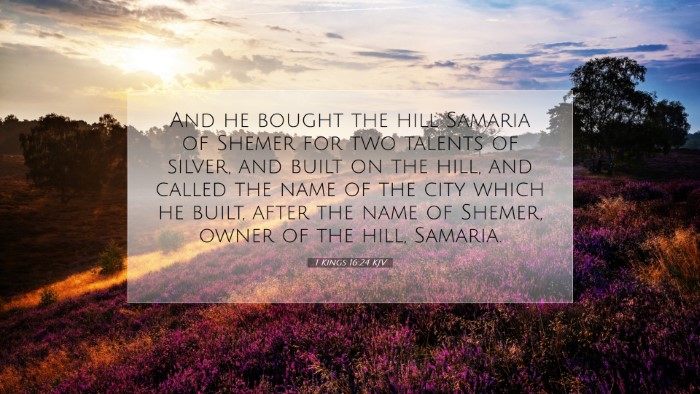Commentary on 1 Kings 16:24
Verse: 1 Kings 16:24 - "And he bought the hill Samaria of Shemer for two talents of silver, and built on the hill, and called the name of the city which he built after the name of Shemer, owner of the hill."
Introduction
This passage reveals the actions of King Omri regarding the establishment of a new capital for the northern kingdom of Israel, which he named Samaria. It is significant for understanding the political and religious history of Israel. The insights provided by renowned commentators such as Matthew Henry, Albert Barnes, and Adam Clarke help to elaborate on the cultural and theological implications of this event.
Contextual Analysis
The Book of 1 Kings provides a historical account that includes the reigns of various kings of Israel and Judah. By the time of Omri’s reign, Israel was embroiled in civil strife and political instability. Omri’s decision to build a fortified city was strategic, aimed at consolidating power and offering a strong refuge. Each of these aspects is crucial for understanding the nature of Israelite monarchy during this era.
Significance of Samaria
Samaria would eventually become more than just a political capital; it would symbolize both the aspirations and the failings of the northern kingdom. The choice of naming the city after Shemer, the previous owner, indicates a respect for property rights as well as a continuation of local lore.
Theological Insights
- Divine Sovereignty: Omri's actions, while politically astute, must be understood within the framework of God’s sovereign plans for Israel. As noted by Matthew Henry, the rise of Omri marks a transition in divine judgment against Israel’s previous kings, particularly Jeroboam's line.
- The Nature of Leadership: Omri’s method of securing power through purchase rather than conquest signifies a pragmatic approach to leadership. Albert Barnes posits that Omri’s reign is illustrative of leaders who prioritize stability and consolidation over moral or spiritual integrity.
- Religious Implications: The building of Samaria also opens a window into the religious shifts that would characterize the northern kingdom. Adam Clarke highlights that the city would later become associated with the idolatry and corruption that plagued Israel during and after Omri’s reign.
Historical Context
Omri's Reign: Omri was the sixth king of Israel and is known for establishing Samaria as the capital after a brief but tumultuous rise to power. His kingship marked a significant pivot in Israeli governance, shifting towards a more systematic and organized approach.
Commentary from Notable Scholars
Matthew Henry
Henry emphasizes that the act of purchasing Samaria was not merely a political maneuver but a significant moment in the prophetic narrative surrounding Israel’s kingdom. He suggests that this establishment symbolizes the height of Israel’s aspirations under Omri, contrasting sharply with the impending decline due to spiritual unfaithfulness.
Albert Barnes
Barnes focuses on the implications of the name “Samaria” and its origins, linking it to Shemer, as a symbol of pride and attachment to terrestrial gains over spiritual fidelity. He notes that Omri's kingship was marked by both success in military and political arenas, yet shadowed by the moral decay that would follow, pointing to the duality of earthly governance.
Adam Clarke
Clarke provides a deeper reflection on the construction of the city itself, suggesting that its geographical and strategic significance was vital for Omri’s plans. He draws attention to the fact that Omri made efforts to fortify the city, illustrating how governance often intertwines with military concerns. This focus on fortification mirrors the spiritual fortifications that Israel would need against the encroaching idolatry.
Conclusion
1 Kings 16:24 encapsulates a turning point in Israel's history under King Omri. It serves as a reminder of the complex interplay between human ambition, divine oversight, and the consequences of leadership choices. The theological, historical, and practical implications of this verse provide ample material for reflection and discussion among pastors, students, and scholars alike.
Reflective Questions
- What lessons can contemporary leaders glean from Omri’s strategy of establishing Samaria?
- How does the choice of city and its naming reflect theological underpinnings in our own lives?
- In what ways can we understand the significance of land and its connection to sacramental living?


